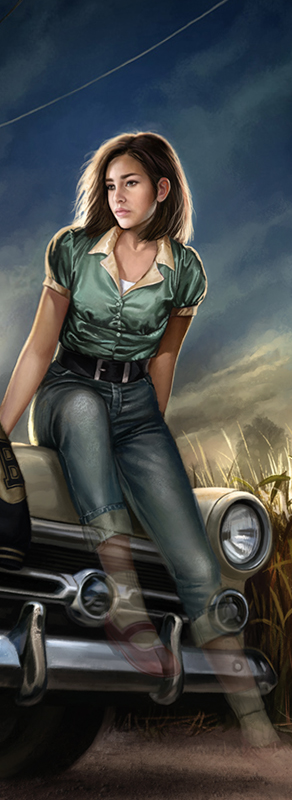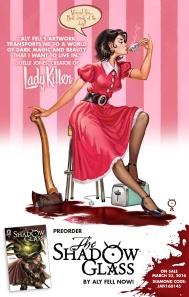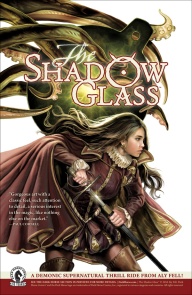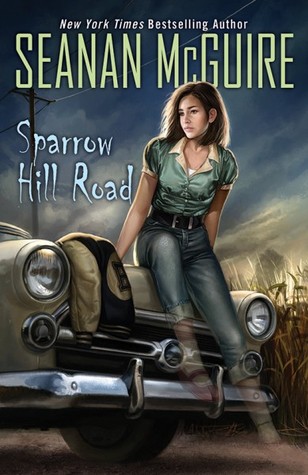 Since she died in 1952, Rose Marshall has been known by many names. The Phantom Prom Date, the Girl in the Diner, the Girl in the Green Silk Dress. A mythology or two have developed around her, and these urban legends span the contiguous United States. Is she a savior, is she a killer, or is she a little of both? One thing is certain: Rose is a road ghost, a ghostly hitcher eternally making her way from one stop to another along America’s hungry roads. Once, she wanted to go home. Now, she wants to get as far away from trouble as she can . . . But trouble is never far from her.
Since she died in 1952, Rose Marshall has been known by many names. The Phantom Prom Date, the Girl in the Diner, the Girl in the Green Silk Dress. A mythology or two have developed around her, and these urban legends span the contiguous United States. Is she a savior, is she a killer, or is she a little of both? One thing is certain: Rose is a road ghost, a ghostly hitcher eternally making her way from one stop to another along America’s hungry roads. Once, she wanted to go home. Now, she wants to get as far away from trouble as she can . . . But trouble is never far from her.
What most people don’t know is that Rose was murdered by a devil of a man called Bobby Cross. Her soul was slated to feed a deal he struck at the crossroads, buying eternal youth and eternal life for a little mayhem. Rose has been on the run from him ever since her death. As she makes her way around the country’s ghostroads, a supernatural echo of the highways and byways in our material world, she helps some folks and hinders others and ultimately builds her own legend. While doing this, she comes to the unwelcome discovery that her fate and that of Bobby Cross are linked, and their fates are entwined for good or ill not only to one another, but to Sparrow Hill Road. That particular stretch of asphalt waits in Buckley Township, Michigan, and it is where death came calling, and Rose was unfortunate enough to be the only one to answer the summons . . .
Seanan McGuire is probably best known for the two urban fantasy series (October Daye and InCryptid) she writes under her own name or the two dark fantasy/horror series she writes under the name Mira Grant (Newsflesh and Parasitology). As with her regular series, the standalone novel Sparrow Hill Road is marketed as urban fantasy; in reality it’s more of a ghost story just told from the ghost’s perspective. Well, several ghost stories to be honest since most of the chapters take as their titles and themes the names of various bits of ghostly legend Rose is responsible for. Like all good ghost stories, Sparrow Hill Road is a little bit spooky, a little bit mournful, a little bit cautionary, and a major reminder that life is precious and should not be wasted. As well, like all ghost stories, it is somewhat hopeful about death – Rose is unliving proof that there is a continuation of personality, not a complete termination of the self as the life signs fade.
Sparrow Hill Road is an episodic narrative, jumping freely across time and plots. It seems to have started out as a series of short stories for The Edge of Propinquity, and therefore falls under the umbrella of being either a mosaic novel (if we are feeling generous) or a fix-up novel (if we are not). The author’s voice is uniform throughout, so there is no sense that parts were written at an earlier phase than others in the author’s career and craft. However, the amount of repetition about simple rules of ghosthood and Rose’s preferences can be a tad tedious (I get it. Rose is cold. She needs to borrow a jacket, and she needs someone alive to buy her food so she can manifest in a close approximation of flesh. I got that in chapter one and darn near. Every. Chapter. After.).
Rose Marshall is the glue that holds this particular book together. It is her story, told by her, and if you like her voice you will be carried away. If you don’t, then you won’t. Simple as that. In my experience, Seanan McGuire’s protagonists have been highly snarky and highly intelligent. Rose is cut from similar cloth. However, this book also has a melancholy to its prose, which gives it a slower pace feel, and some well written atmosphere. It’s not a horrifying book, per se, but it is a spooky one at times. In occasional chapters, it reads like a typical example of urban fantasy, with a highly knowledgeable ghost educating the foolish living about the messes they are accidentally or actively causing. However, for the most part Rose’s story falls into the sort of fun legend that used to be told around campfires or at parties after the music is turned low and exhaustion wears upon the spirits. It’s an attempt on McGuire’s part to either create eerie folklore whole cloth or bring together a whole bunch of folktales she wants to share (probably both).
 The cover art is lovely and a perfect encapsulation of the book’s tone. Aly Fell‘s painting showing our forever-sixteen protagonist leaning on an old car, legs getting translucent near her feet as she dematerializes. A jacket lies cast off nearby. Rose glances off to the side of the painting, maybe with an echo of Luke Skywalker’s wistful look toward the horizon in the Star Wars: A New Hope. Corn and weeds choke the background, rooting Rose (haha) in the Midwest. (Fell’s book, The Shadow Glass, looks pretty wonderful as well!)
The cover art is lovely and a perfect encapsulation of the book’s tone. Aly Fell‘s painting showing our forever-sixteen protagonist leaning on an old car, legs getting translucent near her feet as she dematerializes. A jacket lies cast off nearby. Rose glances off to the side of the painting, maybe with an echo of Luke Skywalker’s wistful look toward the horizon in the Star Wars: A New Hope. Corn and weeds choke the background, rooting Rose (haha) in the Midwest. (Fell’s book, The Shadow Glass, looks pretty wonderful as well!)
Speaking of the location: Parts of this book (major parts, in fact) take place not only in the Midwest but in Michigan. I love when books tackle the place I grew up in. Unfortunately for me, the Michigan from McGuire’s imagination is not the Michigan I grew up in. I’m guessing this Buckley Township is a small burg in the upstate lower peninsula. There are apparently corn fields everywhere (so many that the protagonist bemoans one Michigander girl’s lack of walking in them), and that’s decidedly not the metro Detroit area I called home. I have family who own a farm in Emmett, Michigan, and I can envision parts of the book’s happenings there. Whether it’s the part of Michigan I know or not, it’s still well described.
McGuire excels at evoking all kinds of twists on her supernatural manifestations, and this book has a plethora of them. From the categorizations of road ghosts (hitchers, homecomers, phantom drivers, etc.) to the entities that can be found on her adventures (a spectral hound, a baen sidhe, a haunted stretch of homicidal road, and more). The book offers a wealth of intriguing ideas that might all have roots in our world or not. They are all presented with the author’s gee whiz approach, though filtered through Rose’s world weariness. For those who get lost easily, there’s even a chapter from the Price family’s notes (that would be the cryptozoologist family in the Verity Price series of McGuire’s books) giving brief notes about each of the human and ghost types encountered.
 The novel is a relatively quick read, and while it builds toward a conclusion, it never quite resolves all its loose ends. However, it does a great job satisfying the theme of the work itself: if Sparrow Hill Road is creating a new folktale to be shared and transformed by those who experience it, then that folktale cannot lay its devil and protagonist completely to rest. They have to stick around, maybe waiting for the reader on that late night drive home or that road trip yonder. Hopefully, it’ll be Rose you encounter on that long drive, waiting with thumb outstretched and good intentions in her heart, and not her devilish counterpart . . .
The novel is a relatively quick read, and while it builds toward a conclusion, it never quite resolves all its loose ends. However, it does a great job satisfying the theme of the work itself: if Sparrow Hill Road is creating a new folktale to be shared and transformed by those who experience it, then that folktale cannot lay its devil and protagonist completely to rest. They have to stick around, maybe waiting for the reader on that late night drive home or that road trip yonder. Hopefully, it’ll be Rose you encounter on that long drive, waiting with thumb outstretched and good intentions in her heart, and not her devilish counterpart . . .
Drive safely, everyone!
#
The title for this blog review comes from Bruce Springsteen’s “Thunder Road,” which gets a shout out in Sparrow Hill Road as well as a listing in the book’s “soundtrack” page. I enjoy when an author includes a list of tunes to groove to while reading.
This article copyright © 2016 by Daniel R. Robichaud.
4 thoughts on ““You ain’t a beauty, but, hey, you’re alright”: Seanan McGuire’s Sparrow Hill Road”